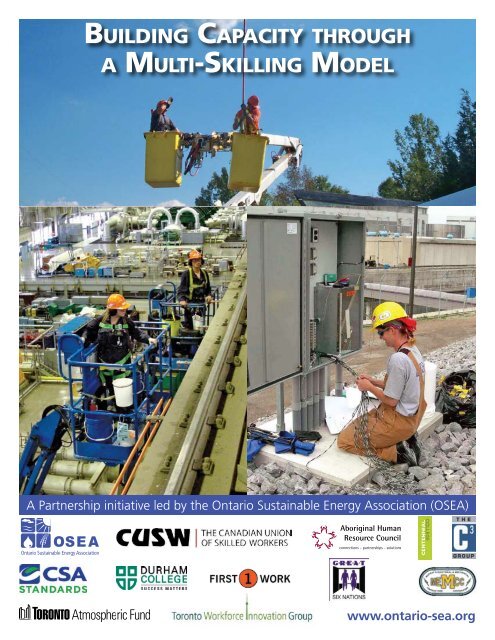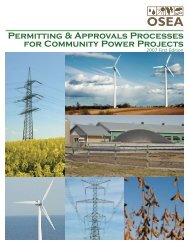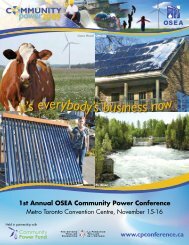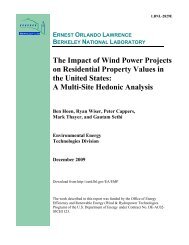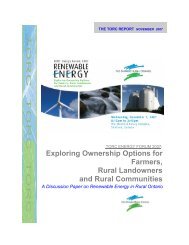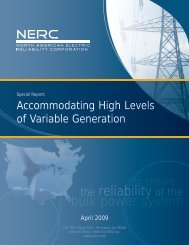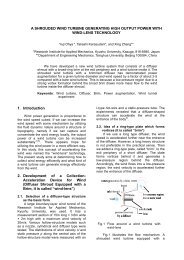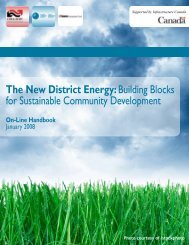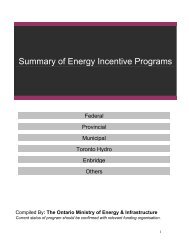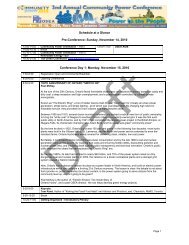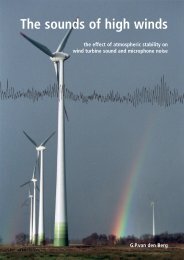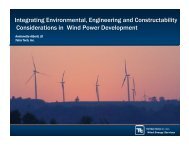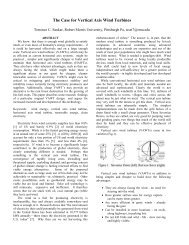Building Capacity Through a Multi-Skilling Model - OSEA
Building Capacity Through a Multi-Skilling Model - OSEA
Building Capacity Through a Multi-Skilling Model - OSEA
Create successful ePaper yourself
Turn your PDF publications into a flip-book with our unique Google optimized e-Paper software.
Bu i l d i n g Ca pa c i t y t h r o u g h<br />
a Mu lt i-<strong>Skilling</strong> Mo d e l<br />
A Partnership initiative led by the Ontario Sustainable Energy Association (<strong>OSEA</strong>)<br />
Ontario Sustainable Energy Association<br />
www.ontario-sea.org
In t r o d u c t io n<br />
The electrical and renewable energy sector is<br />
dramatically changing. According to the 2008 Labour<br />
Market Information Study (ESC, LMI 2008), based on<br />
employer estimates, 28.8% of the current electricity<br />
workforce is expected to retire between 2007 and<br />
2012. The competition to replace these workers both<br />
from within Canada and abroad will be intense.<br />
Electrical transmission and distribution infrastructure<br />
will witness significant upgrading and expansion in the<br />
next decade. In Ontario, this will be due to the need<br />
to replace aging infrastructure and well as to build out<br />
the system to accommodate new and more distributed<br />
forms of generation.<br />
In addition, the sector will see more sophisticated<br />
approaches to energy management. This will be<br />
driven by a focus on conservation programmes at the<br />
level of the building structure and consumer demand.<br />
This will require a different kind labour force, one<br />
that is comfortable with a more holistic, multi-skilled<br />
approach that also balances technical and social<br />
competencies. In short, the electrical and renewable<br />
energy sector will need to proactively position itself to<br />
be able to fill significant labour shortage gaps with a<br />
new kind of worker. The CUSW is responding to this<br />
capacity building need with an initiative referred to as<br />
the <strong>Multi</strong>-<strong>Skilling</strong> <strong>Model</strong>.<br />
Go a l a n d Objectives o f t h e Initiative<br />
The initial goal of the <strong>Multi</strong>-<strong>Skilling</strong> <strong>Model</strong> is to<br />
develop a collaborative plan of action focused on the<br />
identification of the training deliverables that will set<br />
the path for the trades person of yesterday to become<br />
the multi-skilled worker in the emerging market of<br />
tomorrow.<br />
The objectives of the <strong>Multi</strong>-<strong>Skilling</strong> <strong>Model</strong> are twofold:<br />
a) to provide workers with the pathway to gain the<br />
knowledge needed to participate in the emerging<br />
economy and<br />
b) to provide a multi-skilled workforce that adds to the<br />
capacity of the industry when executing everything<br />
from systems expansion, manufacturing to<br />
independent projects. The achievement of objectives<br />
will bring operational flexibility and resilience to the<br />
emerging markets. In turn, the multi-skilled worker<br />
will continually add value to their own working lives<br />
as they follow this journey to knowledge.<br />
Un d e r s ta n d in g t h e Context<br />
In yesterday’s workplace, trades people generally<br />
specialized in their trade alone. The drive towards<br />
sustainability and a green economy means that today’s<br />
workplace requires a range of interconnected skills not<br />
only to allow joined-up thinking and doing on site, but<br />
also to make each worker more flexible, up-to-date in<br />
their skills and employability. Although the workplace<br />
has changed, many of the skills of the trades person<br />
are transferable to the emerging economy.<br />
Un d e r s ta n d in g t h e Opportunity<br />
– A Picture o f t h e Fu t u r e<br />
An understanding of how this opportunity plays out<br />
can be portrayed at both the supply and demand<br />
levels.<br />
a) At a systems or supply level in the energy sector.<br />
In Ontario, the Green Energy & Economy Act and<br />
the green energy projects entitled to connection<br />
have a direct impact on Ontario’s transmission<br />
and distribution systems. These systems, mostly<br />
untouched for many years, are now impacted by<br />
new technologies. The Smart Grid system is in the<br />
process of being developed and implemented.<br />
As the demand for systems expansion and green<br />
energy connections occurs, so does the need for<br />
multi-skilled workers. These workers will be highly<br />
valued as they will have a working knowledge of<br />
systems as a whole and provide resource flexibility to<br />
their employers.<br />
b) At a local level or demand level in the energy sector:<br />
Designing and constructing an efficient building<br />
envelope will have a direct impact on mechanical<br />
system design; building intelligence and automation<br />
systems will require electricians and HVAC installers<br />
to coordinate their efforts; energy efficiency<br />
measures will need to be factored into construction,<br />
as will smart meters and building-integrated<br />
renewable energy systems. Therefore, having an<br />
understanding and working knowledge of these<br />
elements of the whole building will be increasingly<br />
critical in setting ever-higher standards.
Knowledge Workers:<br />
– Contributes to, and receives support from all directions<br />
– Represents the employable force that enables<br />
employer(s) goals<br />
Competencies/Skill Sets as<br />
Learning Objectives:<br />
– Contributes to, and receives<br />
support from all directions<br />
– Partnerships between employers,<br />
unions, learning institutions, etc.<br />
– Develops and supports skills<br />
training (i.e. essential skills,<br />
technology, etc)<br />
Employer(s):<br />
– Contributes to, and receives<br />
support from all directions<br />
Such as:<br />
– Research<br />
– Design<br />
– Manufacture<br />
– HRM<br />
– Install<br />
– Service<br />
– Maintain<br />
– etc.<br />
Emerging Industry:<br />
– Contributes to, and receives support from all directions<br />
Such as:<br />
– Technology change – New technology<br />
– Environment – Political<br />
– Economic – etc.<br />
<strong>Capacity</strong> <strong>Building</strong>:<br />
– Ability of the overall to deliver outcome(s)<br />
– All items in the workforce ecosystem are<br />
part of the external/overall environment<br />
– Research and Development contributes to<br />
and receives support from all directions<br />
– Overall goal is participation<br />
Benefits o f t h e Mu lt i-<strong>Skilling</strong> Mo d e l<br />
There is a synergistic relationship amongst the<br />
parties involved on each unique project or each<br />
unique workplace that can be used to provide a<br />
well coordinated, knowledgeable and value-added<br />
approach to work execution.<br />
More broadly, when applied to other occupations, a<br />
similarly multi-skilled and coordinated approach to<br />
work will result in a level of operational efficiency that<br />
will reduce work lead times, save cost and will result<br />
in enhanced competitiveness and profitability, whilst<br />
affording workers the opportunities to continually<br />
upgrade their skills.<br />
The <strong>Multi</strong>-<strong>Skilling</strong> <strong>Model</strong> opens doors to highly<br />
progressive, efficient and innovative partnerships<br />
between workers and organizations. It will help to<br />
deliver the participation, purpose and knowledge that<br />
are keys to success in the new green economy.
Wo r k Pr o g r a m m e to Realize Benefits o f t h e Mu lt i-<strong>Skilling</strong> Mo d e l<br />
The material presented above is a “concept paper”. It is designed to be a beginning point for the more in-depth<br />
development of a strategy and action plan to realize the benefits of a <strong>Multi</strong>-<strong>Skilling</strong> <strong>Model</strong> and its application to<br />
the electrical and renewable energy sector. The initiators of the concept paper, the CUSW and the <strong>OSEA</strong>, wish<br />
to proceed with the development of the <strong>Model</strong> in collaboration with complementary partners from the electrical<br />
and renewable energy sector. The attached graphic, Workforce Ecosystem, describes the contributor categories<br />
of the key stakeholders groups. The success of this initiative will be largely driven by the full engagement of<br />
representative from these stakeholder categories. The key steps and outputs are as follows:<br />
A Leadership Group of representative<br />
1. organizations have been formed. The<br />
organizations have a significant impact on, and<br />
interest in the design and implementation of this<br />
capacity building initiative. They include the following:<br />
the Aboriginal Human Resources Council, the<br />
Canadian Standards Association, Centennial College<br />
Energy Institute, Durham College, First Work: Ontario<br />
Association of Youth Employment Centres, Grand<br />
River Employment and Training, Murray’s Electrical &<br />
Mechanical Contractors Corporation, The C3 Group,<br />
and Toronto Workforce Innovation Group. The<br />
leadership group acts as a Steering Committee for<br />
this initiative and supports <strong>OSEA</strong> community power.<br />
The Leadership Group’s focus has been on the<br />
2. validation of the concept paper and participants<br />
have set governance conditions for the initiative along<br />
with the review of the work programme.<br />
On the week of October 4th, the Leadership<br />
3. Group, along with a large number of invited<br />
participants, will contribute to an <strong>OSEA</strong> sponsored<br />
Webinar that will have four objectives: 1) to solicit<br />
input into the goals and objective of the initiative,<br />
2) to build an awareness and understanding around<br />
the labour challenges confronting the electrical and<br />
renewable energy sector in the future 3) to enter<br />
into a dialogue with a cross-section of the sector<br />
to determine their perspective on the events and<br />
conditions that will influence the sector from the<br />
perspective of the goals of the initiative as well as<br />
4) to develop a first approximation of a desirable<br />
future, operational “picture” for the <strong>Multi</strong>-<strong>Skilling</strong><br />
<strong>Model</strong><br />
On October 19th and 20th 2010 40 - 50 sector<br />
4. related individuals/organizations will be invited<br />
to an evening session & a one day participatory event<br />
called a SearchFx workshop. Invited participants will<br />
be offered the opportunity to contribute to the success<br />
of the <strong>Building</strong> <strong>Capacity</strong> through a <strong>Multi</strong>-<strong>Skilling</strong><br />
<strong>Model</strong> initiative. The outcome of this facilitated event<br />
will be the preparation of an Implementation vision<br />
and strategy for the <strong>Building</strong> <strong>Capacity</strong> through a<br />
<strong>Multi</strong>-<strong>Skilling</strong> <strong>Model</strong>, the development of an action<br />
plan(s), the setting up of working groups to follow<br />
up on implementation as required, identification of<br />
resourcing requirements and nominal responsibilities<br />
as appropriate. Invited participants to this session will<br />
be drawn from the stakeholder categories illustrated<br />
on the attached Workforce Ecosystem diagram.<br />
In November 2010, the Leadership Group<br />
5. will provide a Call-to-Action in the form of a<br />
white paper that will be presented at the 2nd Annual<br />
Community Power Conference to be held in Toronto<br />
November 15 – 17.<br />
Co n ta c t In f o r m at io n<br />
For more information on the <strong>OSEA</strong>’s Community Power<br />
Planning Services Group contact:<br />
Harry French, Director, Community Power Services<br />
Group at harry@ontario-sea.org • t. 416.977.4441 or<br />
Ryan Manchee, Membership Services at<br />
ryan@ontario-sea.org • t. 416.977.4441<br />
www.ontario-sea.org<br />
Ania Kohinski, Canadian Union of Skilled Workers<br />
– Green Energy Consultant at akohinski@cogeco.ca<br />
• t. 905.357.3504<br />
www.cusw.ca


